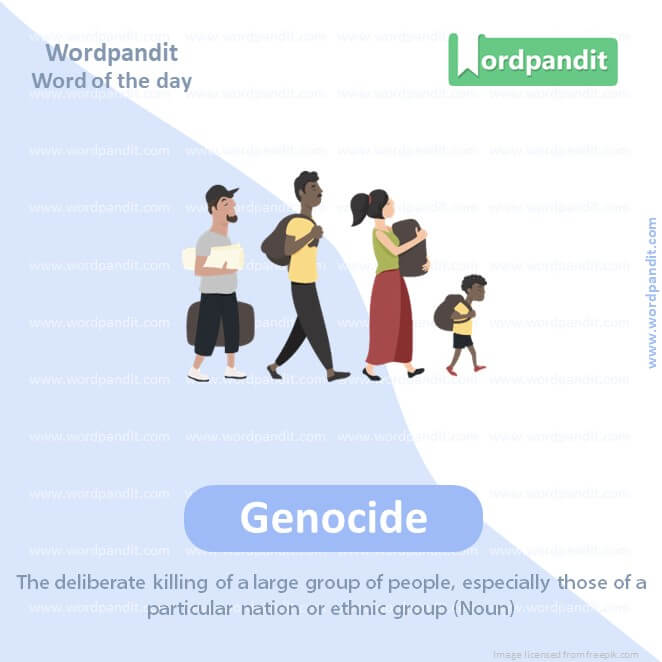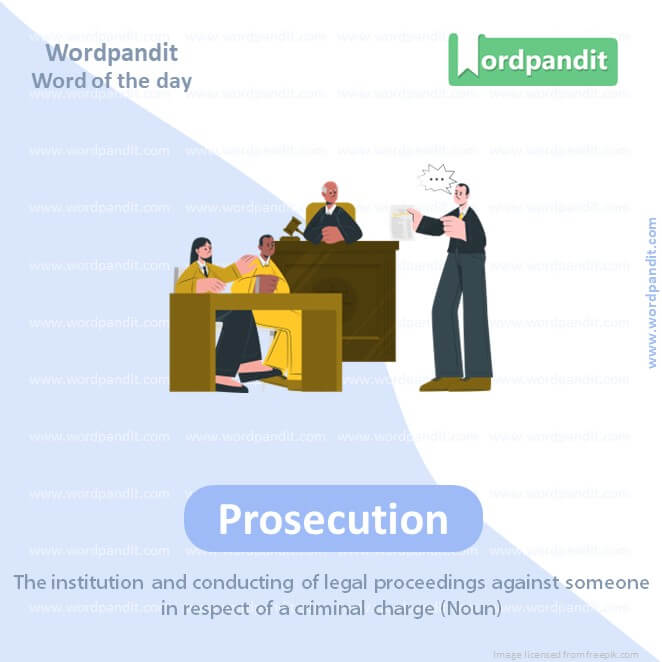Daily Vocabulary Words: List of Daily Used Words in Leading International Newspapers
Hi there. Welcome to this special section @ Wordpandit.
Our endeavour here is very simple: to highlight important daily vocabulary words, which you would come across in leading newspapers in the country. We have included the following newspapers in our selection:
• The New York Times
• The Washington Post
• Scientific American
• BBC
• The Guardian
• Psychology Today
• Wall Street Journal
• The Economist
We are putting in extensive work for developing your vocabulary. All you have got to do is be regular with this section and check out this post on a daily basis. This is your repository of words that are commonly used and essentially, we are posting a list of daily used words. Hence, this has significant practical application as it teaches you words that are used commonly in leading publications mentioned above.
Visit the website daily to learn words from leading international newspapers.

WORD-1: Genocide
CONTEXT: During the week when we mark 75 years of the Universal Declaration of Human Rights and the 1948 convention on the prevention and punishment of genocide, I have been thinking about the genesis of both events and how we should commemorate them now.
SOURCE: The Guardian
EXPLANATORY PARAGRAPH: Genocide is a very sad and terrible thing where a group of people tries to hurt or get rid of another group of people because of who they are, like their race or religion. It’s like being very mean to someone just because they are different.
MEANING: The deliberate killing of a large group of people, especially those of a particular nation or ethnic group (Noun).
PRONUNCIATION: JEN-oh-side
SYNONYMS: Massacre, Slaughter, Extermination, Ethnic cleansing, Annihilation
USAGE EXAMPLES:
1. The international court tries cases of genocide.
2. They learned about the genocide during World War II in history class.
3. Genocide is considered one of the worst human crimes.
4. Efforts are made globally to prevent genocide.
WORD-2: Genesis
CONTEXT: During the week when we mark 75 years of the Universal Declaration of Human Rights and the 1948 convention on the prevention and punishment of genocide, I have been thinking about the genesis of both events and how we should commemorate them now.
SOURCE: The Guardian
EXPLANATORY PARAGRAPH: Genesis means the very beginning of something, like when you start building a big block tower, the first block you put down is the genesis, or start, of your tower.
MEANING: The origin or mode of formation of something (Noun).
PRONUNCIATION: JEN-uh-sis
SYNONYMS: Beginning, Start, Origin, Inception, Commencement
USAGE EXAMPLES:
1. The genesis of her idea came from her childhood.
2. They discussed the genesis of the universe.
3. The book covers the genesis of the civil rights movement.
4. Understanding the genesis of the problem is crucial.

WORD-3: Commemorate
CONTEXT: During the week when we mark 75 years of the Universal Declaration of Human Rights and the 1948 convention on the prevention and punishment of genocide, I have been thinking about the genesis of both events and how we should commemorate them now.
SOURCE: The Guardian
EXPLANATORY PARAGRAPH: Commemorate is like remembering and honoring something important that happened in the past by doing something special, like when you have a party on your birthday to remember the day you were born.
MEANING: To honor the memory of someone or something, especially with a ceremony (Verb).
PRONUNCIATION: kuh-MEM-uh-rate
SYNONYMS: Celebrate, Honor, Remember, Mark, Observe
USAGE EXAMPLES:
1. They gather annually to commemorate the event.
2. A statue was built to commemorate the hero.
3. The ceremony will commemorate the battle’s anniversary.
4. We commemorate our independence on the Fourth of July.

WORD-4: Convention
CONTEXT: Adopted within 24 hours of each other in Paris in December 1948, the universal declaration seeks to protect individuals, while the convention seeks to protect groups. That moment in Paris was revolutionary: a recognition that the rights of the state are not unlimited, that the days of being allowed as a matter of law to trample over human lives were over.
SOURCE: The Guardian
EXPLANATORY PARAGRAPH: Convention is like a big meeting where people who like the same things, like comics or science, come together to talk and share their ideas. It’s like having a big party with people who enjoy the same hobbies.
MEANING: A large meeting or conference, especially of members of a particular group or profession (Noun).
PRONUNCIATION: kuhn-VEN-shuhn
SYNONYMS: Conference, Gathering, Meeting, Assembly, Symposium
USAGE EXAMPLES:
1. They attended a gaming convention.
2. The convention drew experts from around the world.
3. A convention is held annually for the organization.
4. The city hosts a variety of conventions.

WORD-5: Remarkable
CONTEXT: How does it feel? I go back to that period around 1945, to the publication of two books, by two men whose origins and ideas may be traced to the remarkable city of Lviv, and to the law faculty of its university. One was Axis Rule in Occupied Europe by Rafael Lemkin, published in November 1944, in which he coined the word “genocide”. The other is An International Bill of the Rights of Man by Hersch Lauterpacht, published a few months later, in which he set out the ideas that would inform the development of human rights and “crimes against humanity”.
SOURCE: The Guardian
EXPLANATORY PARAGRAPH: Remarkable is when something is very special, amazing, or unusual in a good way, like when you see a really colorful rainbow or someone can do a really cool trick.
MEANING: Worthy of attention; striking or unusual (Adjective).
PRONUNCIATION: rih-MAR-kuh-buhl
SYNONYMS: Extraordinary, Amazing, Astonishing, Incredible, Noteworthy
USAGE EXAMPLES:
1. She made a remarkable recovery.
2. The remarkable scenery took their breath away.
3. His memory was remarkably sharp.
4. The athlete’s remarkable performance won him the medal.

WORD-6: Prosecution
CONTEXT: Both men were part of the prosecution teams at Nuremberg. They prosecuted Hans Frank, who once served as Adolf Hitler’s lawyer, unaware that he was involved in the murder of their entire families. This they only learned at the end of the trial. It would be understandable if both men had curled up in a corner and wept, about the state of the world, about the loss of their families. They didn’t. They developed ideas, then they pushed those ideas. How would they feel today, 75 years on?
SOURCE: The Guardian
EXPLANATORY PARAGRAPH: Prosecution is like when people in charge, like the police or lawyers, try to prove in court that someone did something wrong or broke the law. It’s like telling a teacher that someone broke the rules.
MEANING: The institution and conducting of legal proceedings against someone in respect of a criminal charge (Noun).
PRONUNCIATION: pros-ih-KYOO-shuhn
SYNONYMS: Legal action, Litigation, Trial, Legal case, Legal proceedings
USAGE EXAMPLES:
1. The prosecution presented its case in court.
2. He is facing prosecution for fraud.
3. The evidence was crucial for the prosecution.
4. The lawyer worked for the prosecution.
WORD-7: Deported
CONTEXT: How would they feel about the rights of the writer Victoria Amelina, my friend, and all the other civilians killed in Ukraine? How would they feel about the rights of the Chagossians, forcibly deported from their homes 50 years ago, and still not able to return? How would they feel about a British government that seeks to limit the effect of the European convention on human rights – drafted with significant input from the UK – to allow the country to send people to Rwanda, a place that the supreme court has determined not to be safe? How would they feel about the terrible deaths that occurred in southern Israel on 7 October? How would they feel about the terrible deaths that have followed in Gaza? How would they feel about the mass incarceration of the Uyghurs? How would they feel about the policy of torture embraced after September 11?
SOURCE: The Guardian
EXPLANATORY PARAGRAPH: Deported means someone is sent back to their own country by the government of the country they are in. It’s like if you are playing at a friend’s house and their mom says you have to go home.
MEANING: Expelled from a country, typically because of illegal status or for having committed a crime (Verb, past tense).
PRONUNCIATION: dee-PORT-ed
SYNONYMS: Expelled, Banished, Exiled, Sent back, Repatriated
USAGE EXAMPLES:
1. He was deported back to his home country.
2. The family faced being deported after their visa expired.
3. She was deported for breaking the law.
4. Several people were deported following the investigation.
WORD-8: Incarceration
CONTEXT: How would they feel about the rights of the writer Victoria Amelina, my friend, and all the other civilians killed in Ukraine? How would they feel about the rights of the Chagossians, forcibly deported from their homes 50 years ago, and still not able to return? How would they feel about a British government that seeks to limit the effect of the European convention on human rights – drafted with significant input from the UK – to allow the country to send people to Rwanda, a place that the supreme court has determined not to be safe? How would they feel about the terrible deaths that occurred in southern Israel on 7 October? How would they feel about the terrible deaths that have followed in Gaza? How would they feel about the mass incarceration of the Uyghurs? How would they feel about the policy of torture embraced after September 11?
SOURCE: The Guardian
EXPLANATORY PARAGRAPH: Incarceration is when someone is put in a place like a jail or prison because they broke the law. It’s like being put in a time-out, but for grown-ups who did something really wrong.
MEANING: The state of being confined in prison; imprisonment (Noun).
PRONUNCIATION: in-kar-suh-RAY-shuhn
SYNONYMS: Imprisonment, Confinement, Detention, Captivity, Lock-up
USAGE EXAMPLES:
1. His incarceration lasted for two years.
2. The judge ordered the incarceration of the criminal.
3. She studied the effects of incarceration on families.
4. Incarceration is a common penalty for serious crimes.
WORD-9: Speculate
CONTEXT: We can speculate, but we cannot know. But I know how I feel, on this anniversary, inspired by their ideas and endeavours and those of countless others. I would say: this is not a moment of celebration, but of recognition, of how much remains to be done, and also of what is different today and what we have.
SOURCE: The Guardian
EXPLANATORY PARAGRAPH: Speculate is like making a guess about something when you don’t know all the facts, like trying to guess what you’re getting for your birthday based on little hints.
MEANING: To form a theory or conjecture about a subject without firm evidence (Verb); To invest in stocks, property, or other ventures in the hope of gain but with the risk of loss (Verb).
PRONUNCIATION: SPEK-yoo-layt
SYNONYMS: Guess, Conjecture, Theorize, Hypothesize, Surmise
USAGE EXAMPLES:
1. They could only speculate about the reasons.
2. Investors speculate in the stock market.
3. Speculate wisely to avoid losses.
4. His absence led many to speculate.
WORD-10: Endeavours
CONTEXT: We can speculate, but we cannot know. But I know how I feel, on this anniversary, inspired by their ideas and endeavours and those of countless others. I would say: this is not a moment of celebration, but of recognition, of how much remains to be done, and also of what is different today and what we have.
SOURCE: The Guardian
EXPLANATORY PARAGRAPH: Endeavours are like trying really hard to do something or make something happen, like when you’re trying to build the tallest tower with your blocks.
MEANING: Attempts to achieve a goal; serious or sustained efforts (Noun).
PRONUNCIATION: en-DEV-ers
SYNONYMS: Efforts, Attempts, Ventures, Pursuits, Undertakings
USAGE EXAMPLES:
1. She succeeded in her endeavours to become a doctor.
2. They shared their scientific endeavours at the conference.
3. His literary endeavours were well-received.
4. The team’s endeavours resulted in success.
Vocabulary Daily Use Words
In the architecturally diverse world of language learning, ‘vocabulary daily use words’ act as a cornerstone. We often take these words for granted, but their significance in day-to-day communications is nothing short of monumental. Mastering these ‘vocabulary daily use words’ should be more than an ancillary task on the sideline; it should take the center stage in your language learning journey.
To begin with, approach ‘vocabulary daily use words’ with the same gusto and reverence as you would an untapped treasure chest. Go beyond the conventional realm of textbooks and explore the world of contemporary literature, newspapers, and digital content. By immersing yourself in these mediums, you’re aligning your learning with real-world language usage, thereby gaining a practical understanding of ‘vocabulary daily use words.’
Memory-enhancing tools add an extra layer of effectiveness to your learning. Flashcards, for example, are a great way to make your study sessions interactive and memory-forging. Coupled with the Leitner system, which is a principle of spacing and repetition, you can ensure better recall and understanding of ‘vocabulary daily use words.’
Furthermore, leveraging mnemonic devices aids in etching the ‘vocabulary daily use words’ into your memory. Associating common words with unique and memorable narratives in your mind enhances their recall. Regular revision and using these words in routine conversations further cement your proficiency.
The potency of immersion as a language learning strategy cannot be emphasized enough. Conversing with native speakers, if possible, provides context to ‘vocabulary daily use words’ and boosts your fluency.
In conclusion, mastering the ‘vocabulary daily use words’ is an enriching journey that requires ongoing effort, continual exposure, and hands-on practice. The strategy of learning through various mediums, using memory-enhancing techniques, leveraging mnemonic devices, and immersion can help demystify these words and enhance your overall language proficiency. So, gear up and embrace the linguistic adventure of mastering the ‘vocabulary daily use words.’











